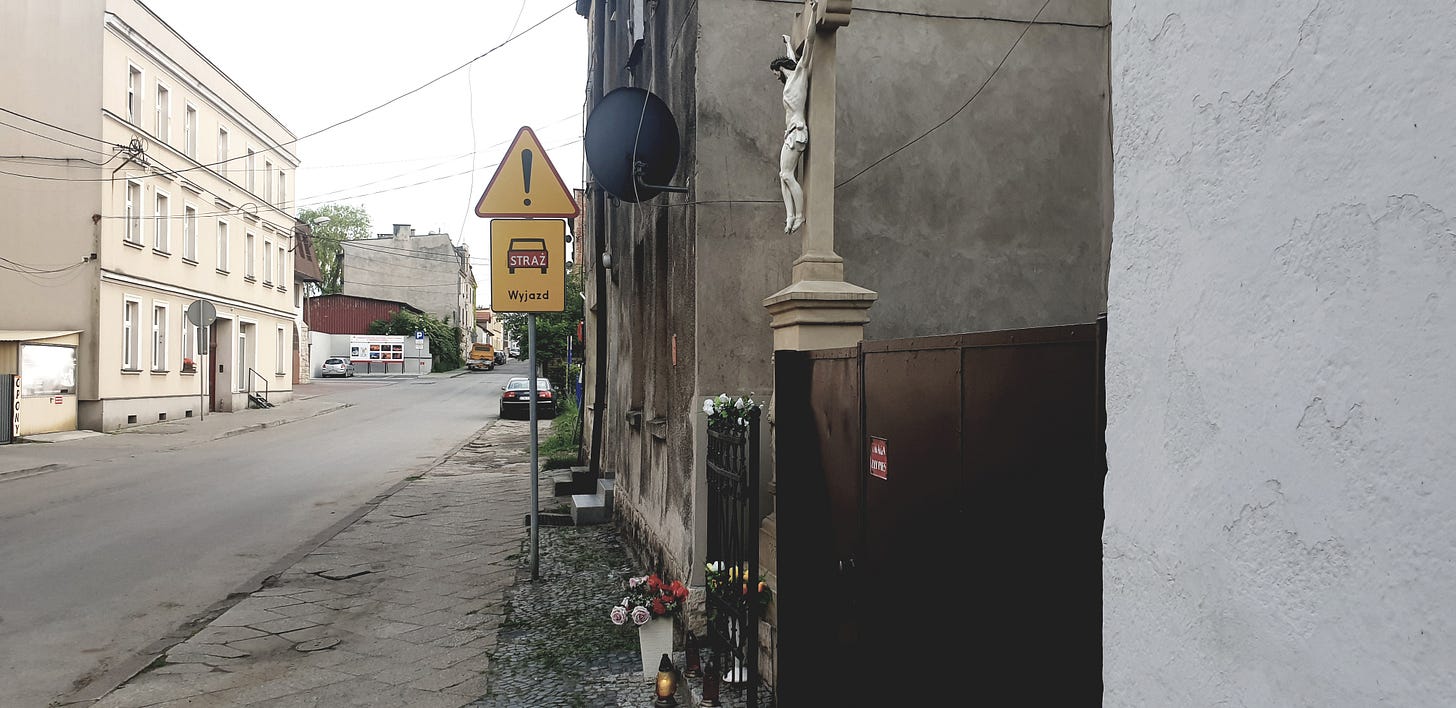"The Sun Is Shining, The Birds Are Singing, The Garbage Truck Is Reversing" Edition
Hello,
Obligatory shilling. I am leading an online course on writing with the great Paideia Forum this summer. It’s not just about the content of writing, it’s also about the practicalities: how to find time, how to get inspiration, and how not to despise your own work. Other interesting courses include the great Philippe Lemoine on epidemiology, Ljiljana Radenovic on philosophy, and Jane Cooper on Milton. Check it out!
I wrote for The Critic about the Metropolitan Police censoring rap music and my paying subscribers about oikophobia.
It’s fucking horrible. The great Aris Roussinos files a bleak report from Eastern Ukraine:
“I guess the Russians will be here in a week,” 65-year-old Viktor tells me as he sits on a bench chewing sunflower seeds in the empty streets of Bakhmut, eastern Ukraine. “I’ll stay of course — I have nowhere else to go. It’s fucking horrible. There’s no gas, and already my wife and I are preparing paraffin lamps for when the electricity goes. What else can we do?”
Well, all war is fucking horrible. But how is this one going compared to others?
What can be. Sergey Radchenko offers cold-eyed realism:
The key to ending the current war in Ukraine lies in finding the right combination of military leverage and political acumen – and in doing it at the right time. This requires an understanding of options. Zelensky is correct to demand our support for Ukraine’s valiant struggle. But because it is also our struggle, we need to have a clearer idea of what endgame we are struggling for.
Radchenko states that the West is in danger of treating the war like a video game. David Hines suggests that it is more comparable to “watching…something bingeworthy on streaming, with almost certain precipitous drop-off in interest in future seasons.”
Sons of Harris. Eerie stuff from Tanner Greer on the logic of sanctions:
Today the closest analogue to the logic of the strategic bomber lies in the world of economics. I speak of sanctions. The parallels are plentiful. Neither trade embargos nor financial sanctions targeting entire banking systems are precision instruments. Just as the bombers of World War II did not have the means to distinguish civilian targets from military ones, so too do attacks on a foreign economy fall hardest on vulnerable civilians. We imagine that the pain these civilians experience will translate into political change—either a change in regime, or a change in regime behavior. But as was the case with strategic bombing, the mechanism by which civilian suffering leads to change is not made clear.
Losers with pretensions to greatness. Park MacDougald reflects on rampage killers:
Tisserand is unable to follow through on the murder and decides to drive back to Paris. He dies in a car crash that night.
Our society seems to have its own generation of Tisserands. The problem, in America, is that ours have guns.
Here’s a question, though: why don’t we have more rampage knifemen in Europe? Don’t get me wrong: a madman with a knife is less dangerous than a madman with a gun. But he’s still dangerous! While it happens, sometimes, it doesn’t happen as frequently (unless I have been paying to little attention to the news).
Third time unlucky? We certainly have dangerous criminals, though. Ed West chronicles British lawlessness:
In my own small way I try to contribute to this debate with the most depressing thread on Twitter, where I chronicle all the violent criminals who are spared jail, and all the horrific crimes that wouldn’t have happened had the perpetrator been put away earlier.
It includes a man who killed his wife, was let out after a few years, then strangled his girlfriend, was released after a shortish sentence, before killing a third woman, hitting her with a claw hammer and throttling her with a dressing gown cord. I presume they won’t let him out again, although knowing the British justice system, who knows.
Remember when… Freddie deBoer assails reference culture:
…the show is much less than the sum of its parts, empty calories, and there’s a hole where its emotional core should be. Its creators trust that enough references will substitute for meaningful relationships, dramatic stakes, and satisfying narrative arcs, so there just isn’t any particular commercial pressure to invest in what really matters.
Yes, but remember when Darth Vader lightsabered Luke’s Solo shot bikini Boba Hutt?
To be fair, extremely online people can succumb to reference culture as well. We just reference Cum Town and Red Scare.
Have a lovely week,
Ben





Most rampage killers in Europe are either political - like the Provisional IRA - or religious, like various Islamic groups, usually of the Wahhabist persuasion. In the US, they tend to be students - or recent ex-students - in public secondary schools, who were isolated and bullied, some under psychiatric care, some not, and who were known to relevant authorities who uniformly failed to take appropriate action, and often used the resultant violence to further their own partisan political agendas. In the latest instance, the guns and ammo used by the shooter cost upwards of $4000, and he was employed as a part-time minimum-wage employee, so that seems a little odd, too. For the past few months, the Democrats in Congress have been on their usual gun-grabbing thing they do in election years. Oddly enough, these shooting incidents go up pretty sharply during these campaigns - it's probably just an interesting coincidence, rather than agitprop. It infuriates their opposition, and pleases their supporters. It pits one half of the country against the other - or at least in past years it did, this year things are a bit different, due to the woke nonsense of last year, people are getting a bit sick of the rabid partisanship of the "woke" crowd, and quite a few have lost faith in the credibility of government for numerous reasons. With the utter failure of the Democratic Party domestic policy to help the working and middle classes - and to funnel huge amounts of money to their donor class - they're going to need some good distractions to continue their tenure in office. Frankly, you could pick members of Congress like you pick members of juries and end up with a better result.
As for Ukraine, the history of Central Europe in the late 1930s is relevant, if Hitler had been forced back into his own country when he moved his troops into Sudetenland and Czechoslovakia, instead of "Peace in Our Time", we might not have had World War II and the ensuing destruction. Putin has his eyes on far more than just Ukraine - "It should be noted that Dugin does not focus primarily on military means as a way of achieving Russian dominance over Eurasia; rather, he advocates a fairly sophisticated program of subversion, destabilization, and disinformation spearheaded by the Russian special services, supported by a tough, hard-headed use of Russia's gas, oil, and natural resource riches to pressure and bully other countries into bending to Russia's will. Dugin apparently does not fear war in the least, but he would prefer to achieve his geopolitical goals without resorting to it.
Drawing on the extensive twentieth-century literature on geopolitics--and especially on the interwar German school of Karl Haushofer--Dugin posits a primordial, dualistic conflict between "Atlanticism" (seafaring states and civilizations, such as the United States and Britain) and "Eurasianism" (land- based states and civilizations, such as Eurasia-Russia). 43 As Wayne Allensworth noted, once one penetrates below the surface of Dugin's seemingly rational and scholarly language in Foundations of Geopolitics, one realizes that "Dugin's geopolitics are mystical and occult in nature, the shape of world civilizations and the clashing vectors of historical development being portrayed as shaped by unseen spiritual forces beyond man's comprehension." 44 In Dugin's treatise, as Allensworth underscores, the author has appropriated almost wholesale "the idea" of Belgian geopolitician Jean Thiriart, who "recognized the Russified Soviet Union as the final bastion of civilization in a Europe overrun by rootless American consumerism." Thiriart earlier had advocated the formation of a new "Holy Alliance" of the USSR and Europe aimed at constructing a "Euro-Soviet Empire," which would stretch from Vladivostok to Dublin and would also need to expand to the south, "since it required a port on the Indian Ocean." https://tec.fsi.stanford.edu/docs/aleksandr-dugins-foundations-geopolitics Aleksandr Dugin has had close ties to Putin since 1999, and Putin's policy comes straight from Dugin's writings.
if I ever catch you referencing Red Scare in a non-derogatory manner I'll cancel my subscription by god